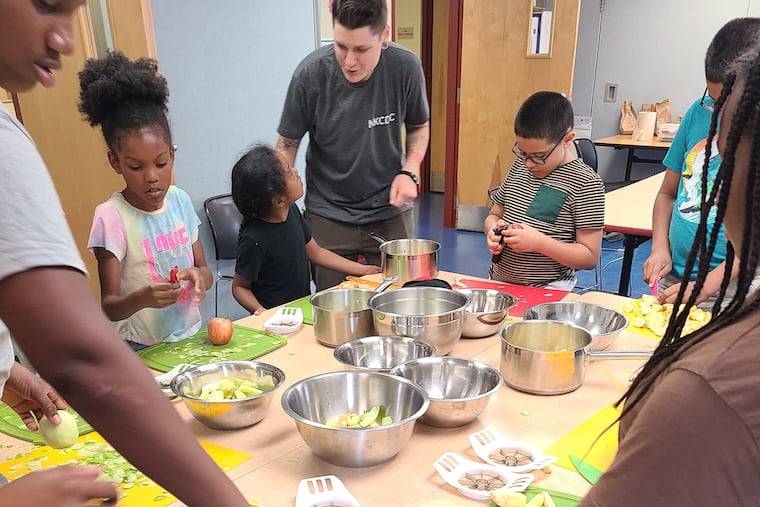This nonprofit is paying Kensington teens to cook for one another
Philly Bridge & Jawn will also work to connect teenagers with other youth service providers in the neighborhood

In Kensington there are a number of organizations and programs dedicated to working with local youths. But the problem is, sometimes it’s hard to actually get kids connected with those services.
“There’s a lot of really fantastic resources and groups in Kensington, but a lot of times our struggling teens don’t have access to that because of trauma [they’ve experienced] or because a lot of times their behavior means they get kicked out of a lot of places,” said Bryan Belknap, who led the LEAP after-school program at the neighborhood’s McPherson Library for several years.
While working with teenagers at the library, he saw many in a persistent fight-or-flight mode because of past experiences, and would often avoid even potentially positive interactions to protect themselves.
“Which then just shrinks their world,” he said.
» READ MORE: These Kensington organizations offer safe spaces for the neighborhood’s children
Belknap’s new nonprofit organization is trying to change that.
Philly Bridge & Jawn, or PB&J, which is funded by a $10,000 grant from the Kensington Community Resilience Fund, will bring a group of 20 Kensington teenagers together. The teens will receive stipends to meet five days a week year-round and cook a meal for each other. Every day, they’ll also be introduced to other youth service providers from the neighborhood.
“The basic demand is come in and get along with everybody and help feed each other,” Belknap said.
“[Then] the idea is really to expand the amount of positive interactions that they have and expand their world back up. And then just give them a low-bar, positive, stable environment that they can show up to every day.”
‘Food is universal’
PB&J will partner with the New Kensington Community Development Corp.’s Nourish program, which provides nutrition education programs for youths and adults.
“Food is universal. Everyone needs to eat,” said Jacquelyn Saez, the Nourish program manager who will work alongside other Nourish team members to direct daily cooking. She is still figuring out the menu for PB&J, but expects to focus on things like tacos and pasta so teenagers with less cooking experience can easily follow along and replicate the recipes at home.
“It just opens up a lot of different [conversations]. It’s hands-on and something folks can be proud of,” she said.
Saez was born and raised in Kensington, so she understands much of what it means to be a teenager there today. “I went to school and came home. Like, my mom didn’t want me outside. She didn’t want me at the after-school program, for safety reasons,” she explained. “I think that’s just another added barrier to folks getting what they need because they’re just trying to get in the house before a certain time. And then some services don’t want to come to this neighborhood.”
Currently, PB&J is ramping up for a pilot version of the fully realized program, which will take place over five days this fall at the Impact Services building on Allegheny Avenue. Belknap is recruiting teenagers for the program, drawing from the relationships he’s already built with Kensington youths to find boys and girls who could use PB&J the most.
Trust is everything with PB&J. The team behind the nonprofit wants to create an environment where teenagers feel safe and welcomed, and not intimidated by the new faces from other service providers who come to visit them. They want to create a place where even as the teenagers work through their own trauma, they can trust that they’ll always be welcomed back.
“You can’t fail out of this program,” Belknap said.
He said that if one of the teenagers were to get in trouble at PB&J or elsewhere, they would certainly need to take accountability and there would be steps they needed to take to rejoin the group. But he feels strongly that kicking a teenager in need out of another program trying to help, or another school, or firing them from another job, is not the answer.
“When somebody makes a mistake, they don’t just disappear,” he said. “And if there’s nowhere for them to go, what will become of them?”